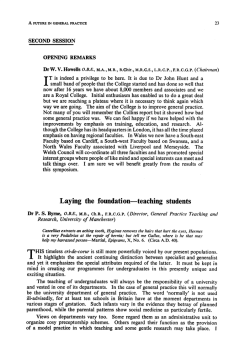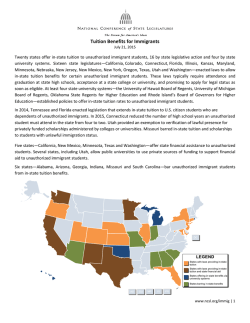
Westminster Higher Education Forum Keynote Seminar The future for
Westminster Higher Education Forum Keynote Seminar The future for undergraduate and postgraduate taught tuition fees Timing: Morning, Tuesday, 24th February 2015 Venue: Glaziers Hall, 9 Montague Close, London SE1 9DD Draft agenda subject to change 8.30 ‐ 9.00 Registration and coffee 9.00 ‐ 9.05 Chair’s opening remarks Rt Hon David Willetts MP, former Minister for Universities and Science 9.05 ‐ 9.45 The impact of the 2012 rise in tuition fees and the sustainability of the system In what ways has the 2012 rise in tuition fees had an impact on application levels: overall, for specific courses and for particular groups of students? How attractive is the loans system, and what more can be done to explain its central features ‐ no payment up front and repayment only after earnings rise above £21,000 ‐ to parents and prospective students? Following the removal of HEFCE grant funding, what impact has the change in tuition fees had on funding levels for universities? In light of recent concerns about a ‘budget gap’ raised by the House of Commons BIS Select Committee report on student loans, what can be done to increase the proportion of the new‐style loans that will be repaid? With the halting of government plans to privatise student debt and the forthcoming removal of the student numbers cap, how financially viable is the student loans system? Professor Nicholas Barr, Professor of Public Economics, London School of Economics and Political Science Claire Crawford, Research Fellow, Institute for Fiscal Studies and Assistant Professor of Economics, University of Warwick Peter Ainsworth, Managing Director, EM Applications Questions and comments from the floor 9.45 ‐ 10.35 The future for undergraduate tuition fees What would be the implications of other options with regard to tuition fees e.g. raising the tuition fee cap ‐ in line with inflation, above inflation ‐ or removing it all together? What would be the impact of replacing tuition fees with a graduate tax; what would the financial implications of this be for graduates, universities and governments? How would student maintenance loans operate in a graduate tax system? In light of the recent reduction of numbers of part time degree students, what more can be done to provide financial support for this group? How does the £6,000 cap on fee loans for students undertaking courses with alternative providers affect the attractiveness of the market for new providers; should the cap be raised in line with the levels applying to established universities? What alternative options are there for reforming the tuition fees and funding system? Alex Bols, Deputy Chief Executive, GuildHE Pam Tatlow, Chief Executive, million+ Megan Dunn, Vice President, Higher Education, NUS Maddalaine Ansell, Chief Executive, University Alliance Senior representative, university mission group Questions and comments from the floor 10.35 ‐ 10.40 Chair’s closing remarks Rt Hon David Willetts MP, former Minister for Universities and Science 10.40 ‐ 11.05 Coffee 11.05 ‐ 11.15 Chair’s opening remarks Jeremy Corbyn MP 11.15 ‐ 11.45 Outcomes from the HEFCE Postgraduate Support Scheme pilots Dr Brooke Storer‐Church, Project Manager, Postgraduate Support Scheme, HEFCE Questions and comments from the floor 11.45 ‐ 12.05 Case studies from the HEFCE pilots Professor David Maguire, Vice‐Chancellor, University of Greenwich Michelle Morgan, Principal Investigator and Project Leader, HEFCE Funded Postgraduate Experience Project and Learning and Teaching Coordinator, Kingston University Rachel Bowden, Head of Institutional Research, University of Brighton 12.05 ‐ 12.55 The future for postgraduate tuition fees What impact has the rise in fees for postgraduate taught courses, in line with the raising of the undergraduate tuition fees cap, had on applications? How appropriate is the £10,000 funding cap proposed for the new postgraduate loans system announced in the Autumn Statement and how is it likely to influence universities’ decisions when setting PGT fee levels? Should there be greater regulation of PGT fees, similar to the undergraduate fee cap? Will the introduction of the new loan system address skills shortages in high‐end industries; and how might these sectors act to further encourage progression into PGT study? What lessons can be learnt from the HEFCE pilots, to inform the implementation of the new postgraduate loan scheme, particularly how to encourage progression to PGT among students from social‐economically disadvantaged backgrounds? In light of the decision to limit postgraduate loans to those under 30, what are the funding options for mature students; is there a continuing role for Professional and Career Development Loans? Rosalind Azouzi, Careers and Education Manager, Royal Aeronautical Society Professor Stephen Machin, Professor of Economics, University College London and Research Director, Centre for Economic Performance Juan Guerra, Chief Executive Officer and Founder, StudentFunder Professor Will Hughes, Director of Postgraduate Taught Programmes, School of Construction Management and Engineering, University of Reading Questions and comments from the floor with Professor David Maguire, Vice‐Chancellor, University of Greenwich and Michelle Morgan, Principal Investigator and Project Leader, HEFCE Funded Postgraduate Experience Project and Learning and Teaching Coordinator, Kingston University 12.55 ‐ 13.00 Chair’s and Westminster Higher Education Forum closing remarks Jeremy Corbyn MP Peter van Gelder, Director, Westminster Higher Education Forum
© Copyright 2026











